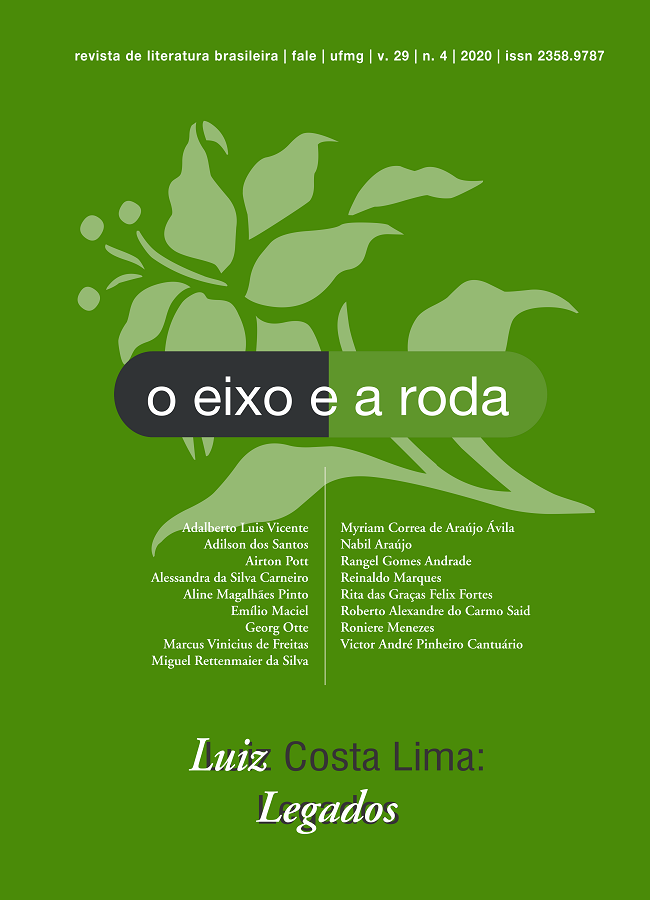Hilda Hilst’s Philosophical Reveries
The Case of the Poem XVI from Balada de Alzira
DOI:
https://doi.org/10.17851/2358-9787.29.4.214-228Keywords:
Hilda Hilst, Balada de Alzira, Contemporary Brazilian Poetry, Western PhilosophyAbstract
The objective of this paper is to show the presence of philosophical issues in Hilda Hilst’s poems, mainly in those published in the books of the 1950s. In those poems, the Paulista writer discussed strictly philosophical questions that would identify her literary production as love, the sacred, the searching for the first principle of the Ancient Greek philosophers, the platonic ideal, death and the drama of existence, the limits and uses of language, and so on. As representative of what has been intended to do, it was selected the poem XVI, from Balada de Alzira (1951) to analyze and comment, to be evident the relation between both the fields of literature and philosophy, and to demonstrate that in those early works, Hilda Hilst, wanting to achieve the maturity of her writing and poetical styles, has written poems in which are evident exercises of thinking and deeply philosophical reflections.
Downloads
References
ARISTÓTELES. Metafísica. 5. ed. São Paulo: Edições Loyola, 2015. v. II.
BACHELARD, Gaston. A poética do devaneio. São Paulo: Martins Fontes, 1996.
BIGNARDI, Ingrid; GUERINI, Andréia. “Pontos de vista de uma mulher”: Giacomo Leopardi “traduzido” por Bruna Becherucci n’O Estado de São Paulo. O Eixo e a Roda, Belo Horizonte, v. 28, n. 3, p. 13-40, 2019. DOI: https://doi.org/10.17851/2358-9787.28.3.13-40
BORGES, Karen Selbach; FAGUNDES, Léa da Cruz. A teoria de Jean Piaget como princípio para o desenvolvimento das inovações. Educação, Porto Alegre, v. 39, n. 2, p. 242-248, maio-ago. 2016. DOI: https://doi.org/10.15448/1981-2582.2016.2.21804. Disponível em: https://revistaseletronicas.pucrs.br/ojs/index.php/faced/article/viewFile/21804/14817. Acesso em: 07 maio 2020.
CASTELLO, José. Potlatch, a maldição de Hilda Hilst, 1994. In: DINIZ, Cristiano (org.). Fico besta quando me entendem: entrevistas com Hilda Hilst. São Paulo: Globo, 2013. p. 157-163.
COELHO, Nelly Novaes. A poesia obscura/luminosa de Hilda Hilst e a metamorfose de nossa época. Revista Ecos, Cuiabá, v. 2, n. 1, p. 7-14, jul. 2004.
COSTA, Édison José da. A geração de 45. Letras, Curitiba, n. 49, p. 53-60, 1998.
CUNHA, Antônio Geraldo da. Dicionário etimológico da língua portuguesa. 4. ed. Rio de Janeiro: Lexicon, 2010.
CUNHA, Rubens da. Hilda Hilst e a experiência romântica do afastamento. Terra roxa e outras terras: Revista de Estudos Literários, Londrina, v. 27, p. 64-73, dez. 2014.
DINIZ, Cristiano (org.). Fico besta quando me entendem: entrevistas com Hilda Hilst. São Paulo: Globo, 2013.
DUARTE, Edson. Recepção da Literatura de Hilda Hilst. Palimpsesto, Rio de Janeiro, n. 18, p. 135-145, jul-ago 2014. Disponível em: https://www.e-publicacoes.uerj.br/index.php/palimpsesto/article/view/34894/24652. Acesso em: 7 maio 2020.
EILAND, Howard. Heidegger’s etymological web. Boundary 2, Durham, v. 10, n. 2, p. 39-58, 1982. DOI: https://doi.org/10.2307/302895. Disponível em: https://www.jstor.org/stable/302895?seq=1. Acesso em: 7 maio 2020.
FORTUNA, Felipe. Com obra reunida, Hilda Hilst é uma poeta complexa e matizada. Folha de São Paulo, São Paulo, 17 jun. 2017. Seção Crítica. Disponível em: https://www1.folha.uol.com.br/ilustrada/2017/06/1893477-com-obra-reunida-hilda-hilst-e-uma-poeta-complexa-e-matizada.shtml. Acesso em: 9 maio 2020.
GAGLIARDI, Caio. Os três Caeiros. In: PESSOA, Fernando. Poemas completos de Alberto Caeiro. São Paulo: Hedra, 2006. p. 9-25.
HEIDEGGER, Martin. Existence and Being. Chicago: Henry Regnery Company, 1949.
HEIDEGGER, Martin. Pathmarks. Cambridge University Press, 1998. DOI: https://doi.org/10.1017/CBO9780511812637
HILST, Hilda. Da poesia. 1. ed. São Paulo: Companhia das Letras, 2017.
HILST, Hilda. Em 50 anos serei considerada genial. O Globo, Rio de Janeiro. 25 dez. 1999. Entrevista concedida a Pedro Maciel. Disponível em: https://revistacaliban.net/quando-morre-mos-podemos-ser-geniais-a2d894169bf7. Acesso em: 10 maio 2020.
HOWARD, Patrick. How literature works: Poetry and the Phenomenology of Reader Response. Phenomenology & Practice, Edmonton, v. 4, n. 1, p. 52-67, 2010. DOI: https://doi.org/10.29173/pandpr19827
KANT, Immanuel. Resposta à Questão: O que é Esclarecimento? Tradução de “Beantwortung der Frage: Was ist Aufklärung?” por Márcio Pugliesi. Cognitio, São Paulo, v. 13, n. 1, p. 145-154, jan.-jun. 2012. Disponível em: https://revistas.pucsp.br/index.php/cognitiofilosofia/article/view/11661. Acesso em: 10 maio 2020.
LAGO, Pedro Corrêa do. A contribuição de Hilda Hilst. Piauí, Rio de Janeiro, 13 maio 2014. Disponível em: https://piaui.folha.uol.com.br/a-contribuicao-de-hilda-hilst/. Acesso em: 10 maio 2020.
LIBERA, Alain. La querelle des Universaux: de Platon à la fin du Moyen Age. Paris: Éditions du Seuil, 1996.
MORRIS, Adam; CARVALHO, Bruno (ed.). Essays on Hilda Hilst: between Brazil and World Literature. Palgrave Macmillan, 2018. DOI: https://doi.org/10.1007/978-3-319-56318-3
NIETZSCHE, Friedrich. Assim falava Zaratustra: um livro para todos e para ninguém. 6. ed. Petrópolis: Vozes, 2011.
NIGHTINGALE, Andrea Wilson. On Wandering and Wondering: “Theôria” in Greek Philosophy and Culture. Arion: A Journal of Humanities and the Classics, Boston, 3. sér., v. 9, n. 2, p. 23-58, 2001. Disponível em: https://www.jstor.org/stable/20163840?seq=1. Acesso em: 10 maio 2020.
PÉCORA, Alcir (org.). Por que ler Hilda Hilst? São Paulo: Globo, 2010.
PESSOA, Fernando. Poemas completos de Alberto Caeiro. São Paulo: Hedra, 2006.
ROSENFELD, Anatol. Hilda Hilst: poeta, narradora, dramaturga. In: HILST, Hilda. Fluxo-Floema. São Paulo: Perspectiva, 1970. p. 10-17.
SUASSUNA, Ariano. Iniciação à estética. 9. ed. Rio de Janeiro: José Olympio, 2008.
ZELIĆ, Tomislav. On the phenomenology of the life-world. Synthesis Philosophica, Zagreb, v. 23, n. 2. p. 413-426, 2008. Disponível em: https://hrcak.srce.hr/index.php?show=clanak&id_clanak_jezik=58496. Acesso em: 11 maio 2020.




 Esta obra está licenciada com uma Licença
Esta obra está licenciada com uma Licença 